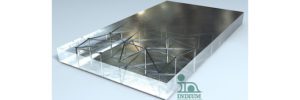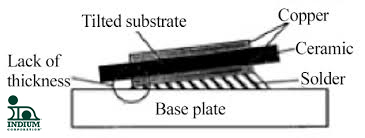
Vehicle manufacturers and materials suppliers are facing increasing packaging challenges as EV designs continue to push for higher power densities, while footprints remain static or become smaller. Higher performance levels mean higher junction temperatures, which in turn require higher thermal reliability and novel thermal management alternatives. These factors create unique reliability challenges for EV power modules, which can lead to common field failures, for example:
- Harsh environments cause thermal cycling and thermal shock defects.
- Mismatched CTE leads to component layers detaching from one another.
- Uneven bond line thickness between the substrate and baseplate increases stress concentration and reduces fatigue resistance during cycling.
Indium, a designer and manufacturer of electronic assembly materials, says uniform planarity mitigates these common defects. Techniques to achieve an even bond line and prevent substrate tilt include stitching and trimming wire bonds, but these can present integration challenges.

Indium’s InFORMS is designed to deliver precision bond line control and soldering in one shot. InFORMS acts as an embedded non-reflowing material within bulk solder. Its preforms and solder ribbon are reinforced matrix solder composites. Indium claims that inFORMS provides precise, repeatable standoff heights, ensuring more than four times the reliability of solder-only preform solutions as a result of reduced stress concentration, mitigated delamination and increased fatigue resistance that can withstand 3,500 thermal cycles.
Source: Indium
source https://chargedevs.com/newswire/solder-redefined-indiums-materials-provide-ev-power-electronics-solutions/
No comments:
Post a Comment